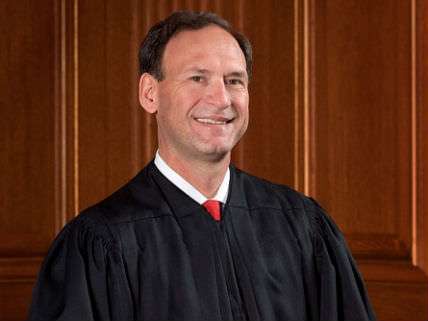Supreme Court Says 4th Amendment Prohibits Warrantless Blood Tests of Suspected Drunk Drivers
But SCOTUS does allow warrantless DUI breath tests incident to arrest.

Today the U.S. Supreme Court struck down a North Dakota law that imposes criminal penalties on suspected drunk drivers who refuse to submit to a warrantless blood test. At the same time, the Court declined to strike down statutes from North Dakota and Minnesota that impose similar criminal penalties on suspected drunk drivers who refuse to submit to warrantless breath tests. Writing for the majority in Birchfield v. North Dakota, Justice Samuel Alito held that the Fourth Amendment forbids the police from conducting warrantless blood tests. Warrantless breath tests, on the other hand, were deemed constitutionally permissible by today's decision.
"The Fourth Amendment permits warrantless breath tests incident to arrests for drunk driving. The impact of breath tests on privacy is slight, and the need for BAC testing is great," Alito wrote. But "we reach a different conclusion with respect to blood tests. Blood tests are significantly more intrusive, and their reasonableness must be judged in light of the availability of the less invasive alternative of a breath test. Respondents have offered no satisfactory justification for demanding the more intrusive alternative without a warrant."
Justice Sonia Sotomayor, joined by Justice Ruth Bader Ginsburg, wrote separately to concur with the Court's stance on warrantless blood tests while dissenting from the Court's acceptance of warrantless breath tests. "Because no governmental interest categorically makes it impractical for an officer to obtain a warrant before measuring a driver's alcohol level, the Fourth Amendment prohibits such searches without a warrant, unless exigent circumstances exist in a particular case," Sotomayor wrote. In other words, Sotomayor would have voided both types of warrantless DUI tests for violating the Fourth Amendment.
Justice Clarence Thomas also wrote separately, taking the exact opposite position of Sotomayor. Thomas concurred in the majority's judgment to allow warrantless breath tests, but he dissented from the majority's refusal to allow warrantless blood tests. In Thomas' view, the Fourth Amendment should be read to permit both types of warrantless searches of suspected drunk drivers. "Both searches contemplated by the state laws at issue in these cases would be constitutional under the exigent-circumstances exception to the warrant requirement," Thomas wrote.
The Supreme Court's opinion in Birchfield v. North Dakota is available here.


Show Comments (155)